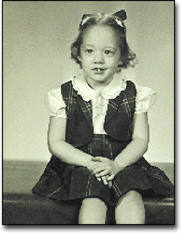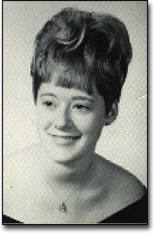Who am I? adoptees
ask
Dover woman finds community
of people sold after birth in her search for her own past
 |
Special to The News Journal/CARLA
VARISCO
Susan Durham, of Dover,
has started a Web site registry that helps other black-market babies search
for their parents and their history.
For
Susan Durham's web site click now
|
By J.L. MILLER
Dover Bureau reporter
08/24/2000
Susan Durham celebrates her
birthday on Feb. 1, but she's not sure whether that is when she was born.
Her birth certificate says
she was born in Kansas. She knows that's a lie.
Where other people have a
family history, Durham has a void.
Durham, a 50-year-old Dover
resident, is a black-market baby. Her adoptive parents essentially bought
her shortly after her birth, and she has spent the last 16 years trying
to determine her origins.
Not only is she using the
power of the Internet to help in her search, but she also has started a
Web page to help other black-market babies reclaim their past.
Durham is far from alone:
Her Web page has received nearly 20,000 "hits," and her Black Market Adoptees'
Registry carries queries from black-market babies from coast to coast.
Some were born in a time
when black-market baby rings were notorious and the people who ran them
made hundreds of thousands of dollars by selling infants for a few hundred
dollars.
Black-market baby rings were
common in the 1930s through the 1960s, though the practice of selling babies
persists today.
Adoption experts say there
is no way to tell how many of the 50,000 U.S. adoptions a year are illegal,
but healthy Caucasian babies today can bring $100,000 on the illicit market,
said Joe Soll, a 60-year-old New York psychotherapist who was a black-market
baby and whose practice deals mainly with adoptees.
 |
|
Susan Durham
|
"Babies are commodities. Cash
commodities," said Peggy Bohannon, a Dover resident whose Web site helps
Delaware adoptees and their birth parents get in touch.
"It still does go on. You
can find [black-market babies] on the Internet," Bohannon said.
A 'complicated' adoption
Durham knew all along that she
was adopted. But it was not until she was in her early 20s that she learned
there was more to her story.
"My adoption was a complicated
one," she said at the kitchen table of her north Dover home.
A small-town Kansas physician
named Dr. Mary Townsend-Glassen arranged Durham's adoption. The birth certificate
Townsend-Glassen signed states that she delivered Durham in her office
in Phillipsburg, Kan.
During a visit to Phillipsburg,
Durham said she told her mother she had a strange feeling, almost as if
she had walked past her birth mother.
"You weren't born in Phillipsburg,"
she said her mother replied.
Durham said her mother later
handed her a book written by Townsend-Glassen and told her she might find
it interesting.
The book contained information
about how the doctor, who was revered as "Dr. Mary," had helped unwed mothers
find good homes for their babies at a time when contraception was uncommon,
abortion was virtually unavailable and the social stigma of illegitimacy
was overwhelming.
 |
|
Susan Durham
|
Pressing her reluctant mother
for details, Durham learned that she had been born in Lincoln, Neb. Her
adoptive parents, whose names Durham did not disclose, had worked through
Dr. Mary to get a baby.
"I know there was money exchanged
for me. I don't know how much," Durham said.
"The instructions given to
my parents were to go to Lincoln, ask for a certain doctor and give him
the money, and he would give them the baby," she said.
The adoptive parents then
took newborn Susan back to Phillipsburg, where Dr. Mary signed a birth
certificate listing them as the baby's birth parents, thus avoiding the
need for a legal adoption.
Durham's family moved to
Oregon when she was 5, and in 1958 her father, a banker, was the victim
of a blackmail attempt centering on her "adoption," Durham said. That's
when Durham's parents hired a lawyer and legally adopted her, using the
documentation that had been furnished by Dr. Mary. The doctor died in the
1970s.
The family moved to Alaska,
where Susan met Harlan Durham, an airman from Dover.
They married in 1969, moved
to Delaware and had two daughters: Taunja Durham, now 28, and Teena Friend,
25.
Durham said she had a happy
childhood and loving parents. She likes her job working with children as
an instructional aide in the Capital School District. She has a family
she loves and a comfortable home.
But something was missing.
"I started to feel that gnawing,
that I needed to know a little bit more about myself," Durham said. "I
didn't feel like I was complete. There were too many open ends."
 |
|
Susan Durham
|
She began making inquiries,
a telephone call here, a letter there. The deeper she dug, the more she
learned about the time a half century ago when American babies where shipped
from state to state for money, often through arrangements made by elaborate
rings.
History of baby rings
Perhaps the most notorious black-market
ring operated out of the Tennessee Children's Home, run by Georgia Tann.
A 1950 investigation determined
that Tann had grossed an estimated $1 million supplying babies to out-of-state
residents.
Brooklyn, N.Y., housewife
Bessie Bernard ran another baby peddling ring in the 1940s.
She paid young unwed mothers,
mainly in Southern states, from $100 to $300 for their babies. Her clients
would pay roughly $2,000 for the babies. Bernard's operation flourished
until New York police smashed it in 1949.
Bernard was sentenced to
a year in prison and fined $2,500.
Soll, the Conyers, N.Y.,
psychotherapist and author, was a Bessie Bernard baby who believes he has
traced his delivery to a Delaware physician. That doctor's name appears
on the birth certificates of several black-market babies, Soll said.
Soll tried to trace his own
roots, but has found no real leads. Even a segment about Soll on television's
"Unsolved Mysteries" failed to bring forth any new information. So, like
Durham, Soll helps others in their quest.
Not knowing one's roots can
lead to a sense of emptiness. Other people know their ethnic origins, but
black-market babies do not.
"I don't know what day to
march in what parade," Soll said. "I'm being flip in a way, but my life
has been a struggle."
Black-market babies' lack
of information can exact a physical toll as well as an emotional one.
Durham is more interested
in learning her family medical history than in finding the woman who bore
her. But still, there is that lingering question: Who was she?
Community is formed
The advent of the Internet has
made it somewhat easier for black-market babies to research their roots.
It also has fostered a sense of community.
"I felt so much better about
my adoption once I found out I was not the only one," Durham said.
She launched her Web site
to give adoptees a place to post information in the hope that someone will
provide a lead.
Durham's Web page also has
photographs of long-gone maternity homes, photographs that for some adoptees
are the only tangible link to their past.
"I have had some people say
what a good feeling it was for them to see these pictures," Durham said.
"Those e-mails give me goose bumps."
Durham's search might be
nearing an end: She has located two grandchildren of Dr. Mary who might
be willing to help.
"There is a piece of me missing,"
she said. "I hope I find mine."
|